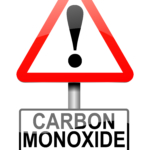First, what is Carbon Monoxide?
 Carbon Monoxide (CO) is an odorless and colorless gas that when not properly vented can cause severe illness or death. It is often referred to as the “silent killer” because early symptoms are often overlooked. CO is found in fumes produced after burning fuels in cars, stoves, lanterns, grills, fireplaces, and gas furnaces.
Carbon Monoxide (CO) is an odorless and colorless gas that when not properly vented can cause severe illness or death. It is often referred to as the “silent killer” because early symptoms are often overlooked. CO is found in fumes produced after burning fuels in cars, stoves, lanterns, grills, fireplaces, and gas furnaces.
When would Carbon Monoxide Poisoning typically occur?
Trace amounts of CO are emitted when an engine or furnace burns gas. When using an outdoor barbecue or driving your car, CO escapes into the outside air and dissipates, which is normal. If the gas furnace that heats your home is functioning properly, the CO is ventilated outside as well. However, if the gas furnace malfunctions, excess CO can get trapped inside a house. The same occurs if outdoor barbecues or outdoor heaters are brought inside without proper ventilation. When this happens, the build-up of CO can cause Carbon Monoxide Poisoning which often results in death. This is particularly important to remember during a power outage. During power outages, people are more likely to bring heaters, intended for outdoor use, indoors. But this is very dangerous. It is NEVER a good idea to bring outdoor gas heating or cooking equipment indoors.
What are the symptoms of Carbon Monoxide Poisoning?
Early symptoms are often described as flu-like, which is why they are easily overlooked. The most common symptoms include, headache, dizziness, fatigue and nausea, but one can also experience chest pain, shortness of breath, and confusion. Symptoms are not so severe that they will wake a sleeping person. If carbon monoxide occurs during sleep, a person will simply die quietly without waking up.
How can I prevent Carbon Monoxide poisoning in my house?
Reducing the risk of carbon monoxide poisoning starts with purchasing battery operated carbon monoxide testers. Since CO is a slightly lighter than air, it will rise, filling the spaces in the high part of the house before filling in low. For this reason, it is best to have CO monitors not just on the main floor, but on every level of your home. Battery operated ones can be purchased at Amazon, or at most local hardware stores.
Next, make sure your gas furnace has been tuned up by a certified technician. Most furnace manufacturers recommend yearly service for optimal performance and efficiency. Cooper Fuel doesn’t do furnace service, but we refer our customers to Peninsula Tank Services 360-613-5866, Dana’s Heating, or Ben’s Heating Service in Jefferson County 360-385-3600.
Lastly, in the case of a power outage, DO NOT use any heating or cooking equipment indoors that is intended for outdoor use. This includes gas powered generators. Here is one of the few propane heaters that is intended for indoor use. Unless the equipment says it is for indoor use, do not take the risk. Carbon Monoxide poisoning is called the silent killer for a reason.

